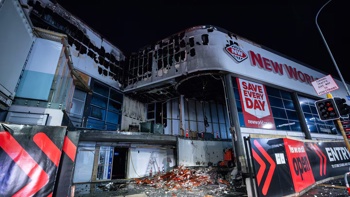Concerns about understaffing at a mental health service that treated a 37-year-old man accused of killing a mother-of-four in Christchurch were escalated to the Minister of Health Andrew Little, the Herald has learned.
In a briefing on January 20, officials at the Ministry of Health told the minister that the workforce at the Canterbury regional forensic mental health service was so stretched that its secure psychiatric facility at Hillmorton Hospital was operating only 12 of its 15 beds and "running a waitlist for acutely unwell patients".
The Herald understands that the man accused of killing Laisa Waka Tunidau, 52, in what police have described as a "random attack" in the suburb of Sockburn on Saturday was treated in the Hillmorton forensic facility.
The chief executive of Canterbury DHB, Dr Peter Bramley, confirmed in a statement on Wednesday that the man "was a patient of the DHB's specialist mental health service based at Hillmorton, who had been on community leave", but did not provide further details about his care.
The DHB is carrying out a full review, Bramley said.
The January briefing to Little followed a series of media reports about unsafe conditions and staff departures at the Hillmorton forensic facility. According to the document, officials from the ministry visited the hospital on January 19, where they discussed the problems with the DHB's leadership and were assured it was working with staff and unions to "put a strong contingency plan in place".
The Ministry later wrote to the DHB's chief executive asking for a turnaround plan with "short, medium, and long-term actions which will be closely monitored".
"The underlying issue appears to be staff have left and are not being replaced," officials told Little. This was a problem across the entire Canterbury mental health service, they noted, with 100 full-time positions vacant in a mental health workforce of around 1,100 at the time.
The problems at Hillmorton are indicative of wider pressures on forensic mental health services nationally, the officials said.
New Zealand's five regional forensic inpatient services were "under considerable occupancy pressures", running at an average occupancy of 104 per cent, officials told the minister in a related memo.
Since that briefing in January, the pressures on forensic services have continued.
The strain on forensic services starkly illustrates how publicly funded mental health providers across the country are struggling to cope with increasing numbers of people seeking their help at a time when there is a drastic shortage of skilled and experienced health professionals.
It also raises serious questions about the safety of some of the most unwell people in the mental health system, the staff who care for them, and the public.
The Herald obtained the briefings as part of a six-month investigation into the state of mental health services, which has included interviews with dozens of service users, carers, clinicians, researchers, and officials; a review of data from more than 25 public bodies; and an examination of thousands of pages of government and health authority documents, many of which have not been made public before.
In a series of articles in recent weeks, the Herald has exposed how the specialist services were weakened by years of underfunding, understaffing, and poor planning and are now failing to respond to an increase in demand that has been amplified by the coronavirus pandemic.
The five regional forensic services, operated by the Canterbury, Capital & Coast, Southern, Waikato, and Waitematā DHBs, exist at the hard end of this system, responsible for some of the most acutely unwell, risky, disadvantaged, and hard-to-treat patients.
/cloudfront-ap-southeast-2.images.arcpublishing.com/nzme/JWRXIKXZSBEUNLOGO26RTL22ZQ.jpg)
The Mason Clinic, run by Waitemata DHB, is the regional forensic psychiatric facility in Auckland. Photo / Dean Purcell
The nature of their work requires intensive staffing and a high level of supervision and security. However, officials say resources have been constrained by a combination of factors: The shortages of psychiatrists, psychologists, nurses and other experienced staff; historic underinvestment in inpatient beds; more people being sent directly to forensic units by the courts; and an increase in the number of acutely unwell inmates in prison.
Forensic psychiatrists say they've been overburdened by the growth of the prison population in recent decades. Nine out of 10 prisoners are estimated to have some form of mental health problem, most have never received adequate treatment, and many deteriorate badly while they are in prison.
But the resources put into mental health care provided by Corrections and DHBs' forensic psychiatric services haven't kept up with the growing need.
When a prisoner becomes severely acutely mentally unwell – for example if they're experiencing an episode of psychosis – they should be transferred to a secure psychiatric facility. But there are so few beds in forensic units and those beds are in such high demand that prisoners are instead put on waiting lists.
In some cases, psychiatrists say, prisoners with severe acute psychosis have been made to wait for weeks without treatment in solitary lockdown where they cannot keep up basic self-care and become extremely disturbed and aggressive.
In a joint editorial in the New Zealand Medical Journal in March 2020, the clinical directors of the regional forensic services described this as a "serious – arguably scandalous – mental health crisis with few options for relief in sight" and called for an urgent Government response.
Canterbury DHB's head of specialist mental health services acknowledged the pressures this was having on the secure Hillmorton facility, Te Whare Manaaki, at a meeting of a public oversight committee in February.
"Probably the highest risk area in terms of access to services," the executive told the committee, according to the minutes. "The team has changed how it operates with a greater focus on flow through the system. We are moving people through from that service into a rehabilitation service more quickly to create some of the space. The risk sits with people potentially being in Corrections, needing our services, but not having access to a bed. That has always been a tension point, but that tension has got higher."
With the increase in demand for forensic services comes more strain on staff.
According to the briefing to Little, employees have been leaving the Hillmorton service "for a variety of reasons", including maternity leave, other jobs in mental health, roles supporting the Covid-19 response, and refusal to comply with vaccine mandates.
But union representatives and former staff say stress, burnout, and safety concerns are a major factor in the departures.
The January memo said the DHB's contigency planning at the forensic facility "includes the use of overtime and bringing staff in from other areas to cover shifts. The DHB is also utilising healthcare assistants and is in the process of recruiting peer workers to provide cover."
Vicki Dent, acting head of specialist mental health services at Canterbury DHB, told the Herald recruitment is the "highest priority" for the department and several new staff are being brought in.
"There is a national shortage of nursing staff across many regions and health specialties," she said. "There are multiple reasons for this and we are working with the Ministry of Health, who are aware of our staffing pressures."
Dr Arran Culver, the Ministry of Health's acting deputy director-general for mental health, said: "It is fair to say that the pressure on forensic mental health services remains high, and we recognise that teams across the country are working extremely hard to maintain high-quality support. This includes services working together nationally and sharing resources where needed.
"The Ministry of Health, and now the new health entities [after the national health restructuring], have detailed work programmes to build the capability and capacity of the mental health and addiction workforce, including specialist services."
"However," Culver added, "the results of this investment will take time, and there are still challenges with forensic mental health services recruitment in all disciplines. At this time of year, teams are also being impacted by winter illnesses and Covid-19. The Ministry is working closely with services as they address the areas of pressure."
- Alex Spence, NZ Herald
Take your Radio, Podcasts and Music with you










